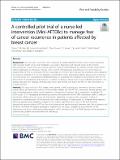Files in this item
A controlled pilot trial of a nurse-led intervention (Mini-AFTERc) to manage fear of cancer recurrence in patients affected by breast cancer
Item metadata
| dc.contributor.author | McHale, Calum Thomas | |
| dc.contributor.author | Cruickshank, Susanne | |
| dc.contributor.author | Torrens, Claire | |
| dc.contributor.author | Armes, Jo | |
| dc.contributor.author | Fenlon, Deborah | |
| dc.contributor.author | Banks, Elspeth | |
| dc.contributor.author | Kelsey, Tom | |
| dc.contributor.author | Humphris, Gerald Michael | |
| dc.date.accessioned | 2020-05-11T12:30:02Z | |
| dc.date.available | 2020-05-11T12:30:02Z | |
| dc.date.issued | 2020-05-07 | |
| dc.identifier | 267650311 | |
| dc.identifier | 4c9031e9-21ce-4500-a084-1ceab1cec22f | |
| dc.identifier | 85085149737 | |
| dc.identifier | 000729238200071 | |
| dc.identifier.citation | McHale , C T , Cruickshank , S , Torrens , C , Armes , J , Fenlon , D , Banks , E , Kelsey , T & Humphris , G M 2020 , ' A controlled pilot trial of a nurse-led intervention (Mini-AFTERc) to manage fear of cancer recurrence in patients affected by breast cancer ' , Pilot and Feasibility Studies , vol. 6 , 60 . https://doi.org/10.1186/s40814-020-00610-4 | en |
| dc.identifier.issn | 2055-5784 | |
| dc.identifier.other | ORCID: /0000-0002-4601-8834/work/73701202 | |
| dc.identifier.other | ORCID: /0000-0002-9274-7261/work/73701709 | |
| dc.identifier.other | ORCID: /0000-0002-8091-1458/work/74117898 | |
| dc.identifier.uri | https://hdl.handle.net/10023/19912 | |
| dc.description | Funding: This pilot trial was funded by the Chief Scientist Office (CSO), which is part ofthe Scottish Government Heath Directorates (reference: HIPS/17/57). | en |
| dc.description.abstract | Background: Fear of cancer recurrence (FCR) is common in people affected by breast cancer. FCR is associated with increased health service and medication use, anxiety, depression and reduced quality of life. Existing interventions for FCR are time and resource intensive, making implementation in a National Health Service (NHS) setting challenging. To effectively manage FCR in current clinical practice, less intensive FCR interventions are required. Mini-AFTERc is a structured 30-min counselling intervention delivered over the telephone and is designed to normalise moderate FCR levels by targeting unhelpful behaviours and misconceptions about cancer recurrence. This multi-centre non-randomised controlled pilot trial will investigate the feasibility of delivering the Mini-AFTERc intervention, its acceptability and usefulness, in relation to specialist breast cancer nurses (SBCNs) and patients. This protocol describes the rationale, methods and analysis plan for this pilot trial of the Mini-AFTERc intervention in everyday practice. Methods: This study will run in four breast cancer centres in NHS Scotland, two intervention and two control centres. SBCNs at intervention centres will be trained to deliver the Mini-AFTERc intervention. Female patients who have completed primary breast cancer treatment in the previous 6 months will be screened for moderate FCR (FCR4 score: 10‑14). Participants at intervention centres will receive the Mini-AFTERc intervention within 2 weeks of recruitment. SBCNs will audio record the intervention telephone discussions with participants. Fidelity of intervention implementation will be assessed from audio recordings. All participants will complete three separate follow-up questionnaires assessing changes in FCR, anxiety, depression and quality of life over 3 months. Normalisation process theory (NPT) will form the framework for semi-structured interviews with 20% of patients and all SBCNs. Interviews will explore participants’ experience of the study, acceptability and usefulness of the intervention and factors influencing implementation within clinical practice. The ADePT process will be adopted to systematically problem solve and refine the trial design. Discussion: Findings will provide evidence for the potential effectiveness, fidelity, acceptability and practicality of the Mini-AFTERc intervention, and will inform the design and development of a large randomised controlled trial (RCT). | |
| dc.format.extent | 10 | |
| dc.format.extent | 888293 | |
| dc.language.iso | eng | |
| dc.relation.ispartof | Pilot and Feasibility Studies | en |
| dc.subject | Breast cancer | en |
| dc.subject | Psychological | en |
| dc.subject | Fear of cancer recurrence | en |
| dc.subject | Feasibility | en |
| dc.subject | Brief intervention | en |
| dc.subject | RC0254 Neoplasms. Tumors. Oncology (including Cancer) | en |
| dc.subject | RC0321 Neuroscience. Biological psychiatry. Neuropsychiatry | en |
| dc.subject | 3rd-NDAS | en |
| dc.subject | SDG 3 - Good Health and Well-being | en |
| dc.subject.lcc | RC0254 | en |
| dc.subject.lcc | RC0321 | en |
| dc.title | A controlled pilot trial of a nurse-led intervention (Mini-AFTERc) to manage fear of cancer recurrence in patients affected by breast cancer | en |
| dc.type | Journal article | en |
| dc.contributor.institution | University of St Andrews. School of Medicine | en |
| dc.contributor.institution | University of St Andrews. Population and Behavioural Science Division | en |
| dc.contributor.institution | University of St Andrews. Centre for Interdisciplinary Research in Computational Algebra | en |
| dc.contributor.institution | University of St Andrews. School of Computer Science | en |
| dc.contributor.institution | University of St Andrews. Sir James Mackenzie Institute for Early Diagnosis | en |
| dc.contributor.institution | University of St Andrews. WHO Collaborating Centre for International Child & Adolescent Health Policy | en |
| dc.contributor.institution | University of St Andrews. Health Psychology | en |
| dc.contributor.institution | University of St Andrews. St Andrews Sustainability Institute | en |
| dc.identifier.doi | 10.1186/s40814-020-00610-4 | |
| dc.description.status | Peer reviewed | en |
This item appears in the following Collection(s)
Items in the St Andrews Research Repository are protected by copyright, with all rights reserved, unless otherwise indicated.

